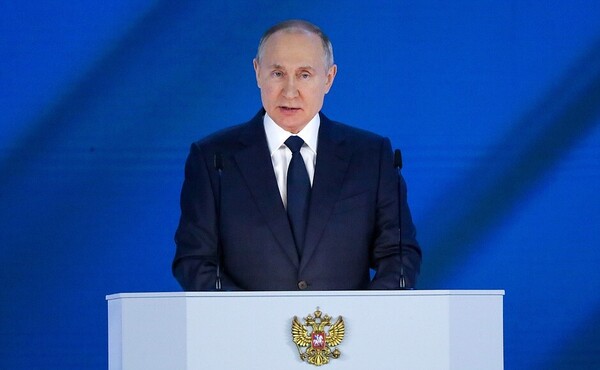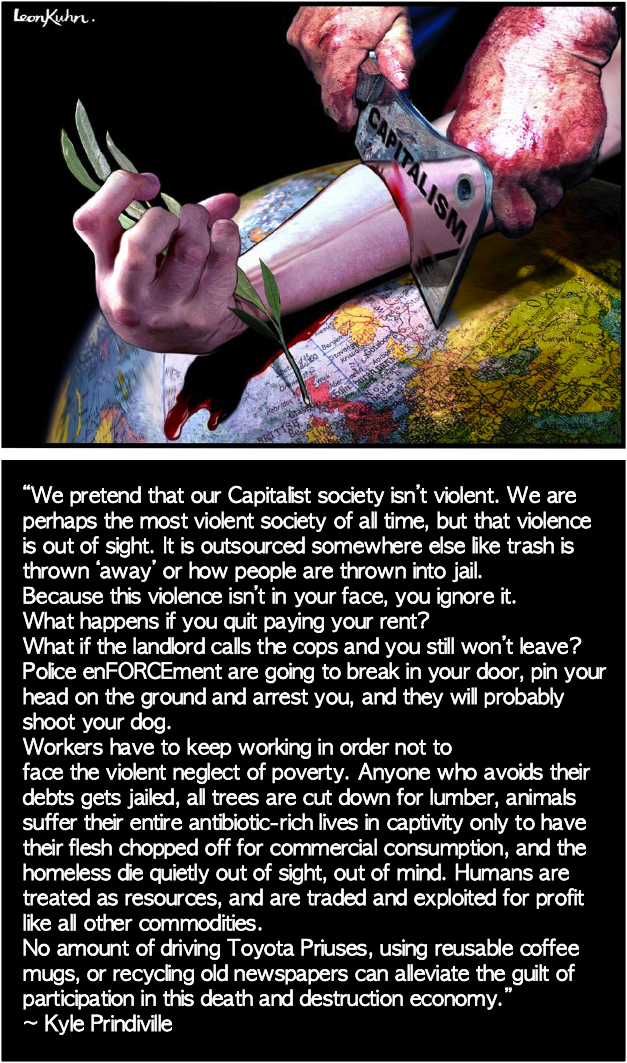President Putin addressed the Russian Federal Assembly April 21st. Full text and photos on the Presidential website. We are presenting his opening, then his remarks on climate, and lastly, his closing remarks on the "meaning and purpose of Russia's policy in the international arena." Putin is stressing self-reliance for his nation. Personal self-reliance requires both accurate information and positive examples. ~ Ed.
The ceremony took place at the Manezh Central Exhibition Hall and was attended by the senators of the Russian Federation, State Duma deputies, members of the Government, the heads of the Constitutional and Supreme courts, regional governors, speakers of regional legislatures, the heads of traditional religious denominations and public activists.
Citizens of Russia,
Today’s Presidential Address to the Federal Assembly will be dedicated mostly to internal issues. These include, naturally, healthcare, social policy and the economy. Of course, I will say a few words about external affairs and literally a few words about security issues....
Colleagues....
...we must find answers to the climate change challenges, adjust our agriculture, industry, the housing and utilities sector and the entire infrastructure to them, create a carbon utilisation sector, bring down emissions and introduce strict control and monitoring measures.
Over the next 30 years, the cumulative emissions in Russia must be smaller than in the EU. It is an ambitious goal, considering the size of our country and the specific features of its geography, climate and economic structure. However, I have no doubt whatsoever that it is a perfectly realistic goal in light of our research and technological potential.
Our new energy and pharmaceutical sectors and the solution of climate problems must provide a powerful boost to a comprehensive modernisation of all economic sectors and the social sphere. It is a direct path to the creation of modern and well-paid jobs.
The efforts taken by each level of government, business, development institutions and the Russian Academy of Sciences must have in view the main, central task: to improve the quality of life for our people. I would like to point out that our position on environmental protection is a matter of principle in this respect, and it will definitely remain unchanged.
The dangers of the alternative position have been recently exemplified by the events in Norilsk, Usolye-Sibirskoye and several other places. We will certainly help the people who live there, but we must also preclude a repetition of such environmental disasters.
I would like to ask those responsible to accelerate the adoption of a law on the financial responsibility of enterprise owners for clearing up the accumulated pollution and for the reclamation of industrial sites. This is a very simple approach. Here it is: if you have benefited from polluting the environment, clean up after yourself. We must act harshly. Rosprirodnadoz [the Federal Service for Supervision of Natural Resources] and other regulatory authorities must do their jobs.
I would like to add that the “polluter pays” principle must also be employed in full in the waste disposal sector to ensure transition to the so-called closed-loop economy. With this aim in view, we must launch a mechanism of extended producers and importers’ responsibility for the management of products and packaging wastes as soon as this year.
I also propose marking environmental payments to the federal budget. I know that experts and financial specialists do not like such special marks, but I see this as a vital sphere of our activity. We can make an exception in this case, and invest these funds in clearing up accumulated pollution and improving the environment.
Also, as I said, the amount of hazardous emissions in Russia’s 12 largest industrial centres must be reduced by 20 percent by 2024. We have already discussed this. Obviously, this goal must be accomplished through a comprehensive modernisation of the industrial sector, the housing and utilities sector, transport and energy.
Moreover, I propose expanding the emission quota system to all Russian cities with major air quality problems and introduce strict liability for non-compliance with environmental regulations. Of course, this requires transparent monitoring.
We will definitely support the efforts of businesses to upgrade their facilities up to current environmental standards....
Colleagues,
The meaning and purpose of Russia’s policy in the international arena – I will just say a few words about this to conclude my address – is to ensure peace and security for the well-being of our citizens, for the stable development of our country. Russia certainly has its own interests we defend and will continue to defend within the framework of international law, as all other states do. And if someone refuses to understand this obvious thing or does not want to conduct a dialogue and chooses a selfish and arrogant tone with us, Russia will always find a way to defend its stance.
At the same time, unfortunately, everyone in the world seems to be used to the practice of politically motivated, illegal economic sanctions and to certain actors’ brutal attempts to impose their will on others by force. But today, this practice is degenerating into something even more dangerous – I am referring to the recently exposed direct interference in Belarus in an attempt to orchestrate a coup d’état and assassinate the President of that country. At the same time, it is typical that even such flagrant actions have not been condemned by the so-called collective West. Nobody seemed to notice. Everyone pretends nothing is happening.
But listen, you can think whatever you like of, say, Ukrainian President [Viktor] Yanukovych or [Nicolas] Maduro in Venezuela. I repeat, you can like or dislike them, including Yanukovych who almost got killed, too, and removed from power via an armed coup. You can have your own opinion of President of Belarus Alexander Lukashenko’s policy. But the practice of staging coups d’état and planning political assassinations, including those of high-ranking officials – well, this goes too far. This is beyond any limits.
Suffice it to mention the admission made by the detained participants in the conspiracy about a planned siege of Minsk, including plans to block the city infrastructure and communications, and a complete shutdown of the entire power system in the capital of Belarus! This actually means they were preparing a massive cyberattack. What else could it be? You know, you cannot just do it all with one switch.
Clearly, there is a reason why our Western colleagues have been stubbornly rejecting Russia’s numerous proposals to establish an international dialogue on information and cyber security. We have come up with these proposals many times. They avoid even discussing this matter.
What if there had been a real attempt at a coup d’état in Belarus? After all, this was the ultimate goal. How many people would have been hurt? What would have become of Belarus? Nobody is thinking about this.
Just as no one was thinking about the future of Ukraine during the coup in that country.
All the while, unfriendly moves towards Russia have also continued unabated. Some countries have taken up an unseemly routine where they pick on Russia for any reason, most often, for no reason at all. It is some kind of new sport of who shouts the loudest.
In this regard, we behave in an extremely restrained manner, I would even say, modestly, and I am saying this without irony. Often, we prefer not to respond at all, not just to unfriendly moves, but even to outright rudeness. We want to maintain good relations with everyone who participates in the international dialogue. But we see what is happening in real life. As I said, every now and then they are picking on Russia, for no reason. And of course, all sorts of petty Tabaquis are running around them like Tabaqui ran around Shere Khan – everything is like in Kipling’s book – howling along in order to make their sovereign happy. Kipling was a great writer.
We really want to maintain good relations with all those engaged in international communication, including, by the way, those with whom we have not been getting along lately, to put it mildly. We really do not want to burn bridges. But if someone mistakes our good intentions for indifference or weakness and intends to burn or even blow up these bridges, they must know that Russia’s response will be asymmetrical, swift and tough.
Those behind provocations that threaten the core interests of our security will regret what they have done in a way they have not regretted anything for a long time.
At the same time, I just have to make it clear, we have enough patience, responsibility, professionalism, self-confidence and certainty in our cause, as well as common sense, when making a decision of any kind. But I hope that no one will think about crossing the “red line” with regard to Russia. We ourselves will determine in each specific case where it will be drawn.
I will now say, just as I always do during the annual addresses to the Federal Assembly, that the improvement and qualitative strengthening of Russia’s Armed Forces continues on a regular basis. In particular, special attention will be given to the development of military education both at military school and academies and at military training centres at civilian universities.
By 2024, the share of modern weapons and military equipment in the armed forces will reach nearly 76 percent, which is a very good indicator. This share in the nuclear triad will be over 88 percent before this year is out.
Standing on combat duty are the latest Avangard hypersonic intercontinental missile systems and the Peresvet combat laser systems, and the first regiment armed with Sarmat super-heavy intercontinental ballistic missiles is scheduled to go on combat duty in late 2022.
The number of combat air systems with Kinzhal hypersonic missiles, and warships armed with precision hypersonic weapons such as Kinzhal that I mentioned, and with the Kalibr missiles, is increasing. The Tsirkon hypersonic missiles will be put on combat duty soon. Work is underway on other modern combat systems, including Poseidon and Burevestnik, in accordance with the development plans of the Armed Forces.
As the leader in the creation of new-generation combat systems and in the development of modern nuclear forces, Russia is urging its partners once again to discuss the issues related to strategic armaments and to ensuring global stability. The subject matter and the goal of these talks could be the creation of an environment for a conflict-free coexistence based on the security equation, which would include not only the traditional strategic armaments, such as intercontinental ballistic missiles, heavy bombers and submarines, but – I would like to emphasise this – all offensive and defensive systems capable of attaining strategic goals regardless of the armament.
The five nuclear countries bear special responsibility. I hope that the initiative on a personal meeting of the heads of state of the permanent members of the UN Security Council, which we proposed last year, will materialise and will be held as soon as the epidemiological situation allows.
Russia is always open to broad international cooperation. We have consistently advocated the preservation and strengthening of the key role of the United Nations in international affairs, and we try to provide assistance to the settlement of regional conflicts and have already done a great deal to stabilise the situation in Syria and to launch a political dialogue in Libya. As you know, Russia played the main role in stopping the armed conflict in Nagorno-Karabakh.
It is on the basis of mutual respect that we are building relations with the absolute majority of the world’s countries: in Asia, Latin America, Africa and many European countries. We are consistently expanding as a priority contacts with our closest partners in the Shanghai Cooperation Organisation, BRICS, the Commonwealth of Independent States, and our allies in the Collective Security Treaty Organisation.
Our common projects in the Eurasian Economic Union are aimed at ensuring economic growth and the wellbeing of our people. There are new, interesting projects here, such as the development of transport-and-logistics corridors. I am sure they will become a reliable infrastructure backbone for large-scale Eurasian partnership. The Russian ideas of this broad, open association are already being put into practice, in part, via alignment with other integration processes.
All these projects are not just geopolitical ideas but strictly practical instruments for resolving national development tasks.
![]() Don't forget to feed the birds. Donate here
Don't forget to feed the birds. Donate here









